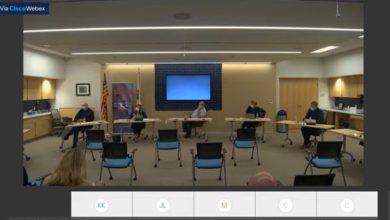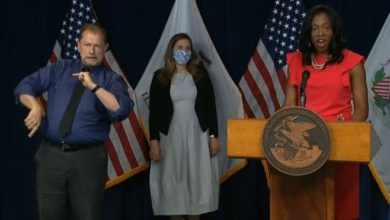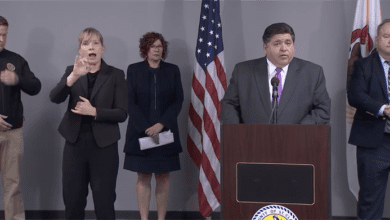What the stimulus package, tax extension and small business relief mean for you

Unprecedented legislation and actions by both the United States and Illinois governments have left residents with a lot of questions about how they move forward.
Every measure from the CARES Act, the July 15 tax extension, programs for small businesses to questions about a looming recession and skyrocketing unemployment numbers have Americans questioning how the policies will be implemented.
First State Bank of Forrest’s Branch Manager and Loan Officer Nick Schneider said once the laws are established, the execution takes some time.
“Until that law is finally passed, they really can’t send out any guidance,” he said.
“What it’s going to mean for us on a day-to-day basis, we can do our best to make guesses based on what’s in there, but we’ll see how it all finally shakes out when it’s all done.”
Schneider added that the federal government has a little more leeway on making programs and policies whereas each state has limitations on what they can do until the federal government acts. Part of this comes with the federal government’s ability to print money, like it did for the coronavirus stimulus program, whereas the state does not have that ability.
This was the case when the United States government extended the 2020 tax deadline from April 15 to July 15. Illinois announced the same extension on March 25.
“The federal government’s kind of in charge, and the state kind of needed to go second because it’s more of an appropriate thing to do,” Schneider said.
The coronavirus relief program will supply:
Single adults who make $75,000 annually or less $1,200;
Married Americans who make $150,000 annually or less $2,400;
Both single adults and married couples will also receive $500 per child.
The checks, which are nontaxable, will be based on 2019 tax returns, if already filed. If a 2019 tax return has not been filed, the basis will be what was reported in 2018.
Single adults making between $75,000 and $99,000 will see some relief, but those making over $99,000 will not receive a check. Couples who make between $150,000 and $198,000 will see some money, but those who make over $198,000 will not receive anything.
Schneider said that everyone hopes the influx of money to citizens will help float the economy until the COVID-19 crisis is over.
“What this is really trying to do is to continue the flow of money in the economy,” he said.
The historic bailout was not in the 2020 federal budget.
“We’ll see how this works out,” Schneider said. “We’ve seen recessions, we’ve seen depressions, but this is different.”
Schneider added that the economy was doing well prior to March 13.
“I think the length of how long this lasts is going to determine how quick of recovery we can have from it,” he said.
Thursday’s headlines included 3.2-million jobless claims, which is nearly 5-times the previous record set in 1982.
Schneider looks at claims where some analysts said the unemployment rate would be 4 million and others saying 800,000, and he can see that everyone is “grasping at straws” in trying to predict what might be next.
The uncertainty was captured in the stock market recently. After an early week plunge, Wednesday and Thursday showed rebounds over the promise of a stimulus package.
“If you’ve got money in a 401k with the stock market, you know, look at it, but if you’re not close to retirement, you gotta remember the long game is the best game,” Schneider said.
Other measures to help taxpayers includes a tax date extension. Schneider said that if people don’t owe anything on their tax returns or may be getting money back, filing now is still in their best interest.
“There’s no reason not to go ahead and file now,” Schneider said. “The federal government is saying 21 days turnaround time for refunds. That money is yours. You should get it when you can, as quick as you can.”
Taxpayers who may be in need of or looking for extra time to pay 2019 taxes don’t have to file for an extension in 2020, but can wait until July 15 to file and make those payments.
“Some people are traditionally late filers,” he added. “For whatever reason, they don’t file April 15; they’re usually filing an extension for a month, three months, six months. You don’t need to do that, you’ve got ’til July 15.”
According to the IRS, 88-percent of Americans file their taxes online, but for those without internet access or those who need additional assistance, Schneider said the extension will help and that the IRS will provide assistance over the phone.
“They’re there to help you,” he said. “We do regard the IRS as kind of a necessary evil sometimes. But mostly they are there to help you; they’re not there to hurt you. They want you to ask the questions so you can file correctly.”
Delayed taxes, at both the state and federal level, could impact local taxing bodies.
“That money is not going to be there for them to be doing their programs that they have intended to do,” Schneider said. “You may see some delays in funding or around local programs that haven’t dissipated getting funding for the time.”
Schneider said eventually the money should come.
“The state isn’t in the best financial shape, as we all know, so it’s going to definitely affect their bottom line, they’re used to a large cash flow in April, at the traditional tax deadline, that’s gonna be stretched out longer into the summer.”
With so many people filing for unemployment, which happens at the state level, and additional costs related to healthcare, the Illinois budget will be strained.
But, Schneider also said that banks are running as usual, minus access to some lobbies, and people do not need to panic.
FDIC insured banks guarantee that money up to $250,000 is guaranteed.
“You can go to any of the banks and they would explain to you what your FDIC insurance covered,” Schneider said. “You can also go to the FDIC website, and there’s a program there called (EDIE) Electronic Deposit Insurance Estimator; and you’re going to implement your own personal (information), how much money you have in what bank and how it’s titled and it’ll tell you that how much you’re covered.”
Schneider said that local banks will print out the information, as well.
With reports of people taking out large sums of money, Schneider suggests that people continue to just keep the amount of cash on hand that they normally would.
“The banks are all open,” he said. “We’re all functioning right now with just drive-up only but you can go to your bank and you can get your money on a regular basis, a daily basis.”
He cautioned against keeping too much money at home, saying that it’s not insured at home, should something happen.
“Things like this sometimes can lead to people, not being the most honest,” he said. “Robberies, occasionally, do go up.
“If you have cash in your home, you have no no proof that you’ve had $100 or $10,000 under your pillow. So if something like that gets taken out of your house you’re kind of out of that money.”
The stimulus bill is also extending the time period of unemployment to 13 weeks of benefits, which will include an additional $600 on top of the state benefit.
Schneider said that there are also many federal and state programs that are being offered to help small businesses with grant and loan opportunities at this time.
SBA (Small Business Administration) is offering Disaster Loan Assistance, which any small business can apply for.
“They’re talking to three- or four-week turnaround time about approval, but any business can apply. There’s no cost to it,” Schneider said.
“You can get some money for this, and you can stretch out the money over a long time at 3.75-percent for businesses, 2.75-percent for non-profit. And you go up to 30 years on it.”
The Illinois Department of Commerce and Economic Opportunity has a grant program for restaurants.
“That’s a good thing because with grants, you don’t have to ever pay that back,” Schneider said.
“Restaurants have their own little program there because the hospitality injury has been hit so hard.”
Not only did some restaurants close down when groups of 10 or more were no longer allowed, but those that stayed open had to figure out how to set up new systems for ordering, takeout or delivery.
The grant programs are only open to the restaurants until April 1, though. Once applications are in, a lottery system will be utilized to disburse the funds.
Small businesses in rural towns in downstate Illinois are also eligible for $25,000 grants.






What definitely do the people on social security an social security disability get if they don’t make enough to file taxes. You read everything an it says nothing indefinitely for us people